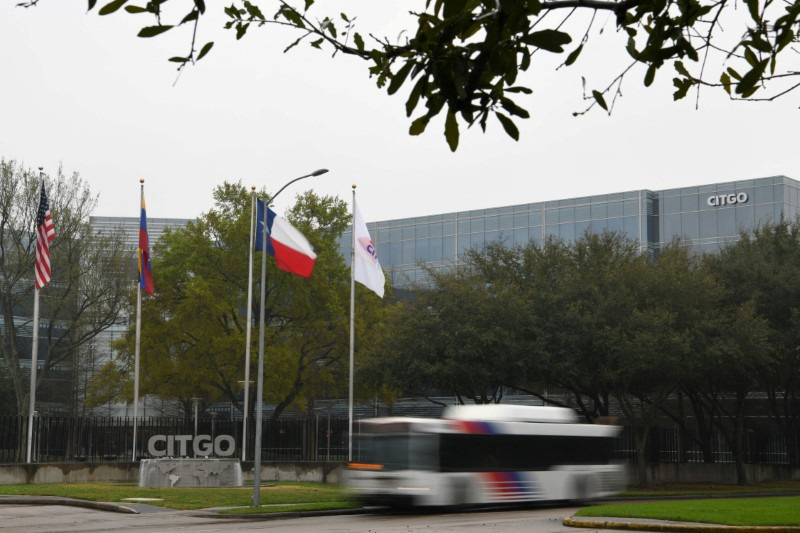By Marianna Parraga and Gary McWilliams
(Reuters) -A U.S. court on Friday approved claims by 17 Venezuela-linked creditors, including ConocoPhillips (NYSE:COP), Rusoro Mining and Koch Industries, to get proceeds from a coming auction of shares in the parent of Venezuela-owned oil refiner Citgo Petroleum to satisfy claims for expropriations and debt defaults.
The list, which reduced the scope of the claims to $20.8 billion from the $24 billion sought by creditors, comes after a court officer excluded arbitration awards and court rulings that had failed to satisfy the court's requirements on time.
Creditors have flocked to a U.S. court in Delaware to press claims that are almost double Citgo's $11 billion to $13 billion value. The Houston-based refiner operates an 807,000-barrel-per-day refining network, 38 terminals, six pipelines and supplies 4,200 independent retailers.
First bids for the shares are due on Monday with a second bidding round to come later this year. A final decision on the winners is still months away, with awards requiring approval by the U.S. Treasury Department, which has protected Citgo from creditors since 2019.
A board supervising the refiner has been in payment negotiations with U.S. oil producer ConocoPhillips, Canadian miner Crystallex Corp and organized bondholders for over a year, but no settlements have been announced.
Citgo declined to comment on the court decision.
Friday's decision gives priority in payments to Canadian miner Crystallex, which brought the case, Tidewater (NYSE:TDW), Conoco, O-I Glass (NYSE:OI), and Huntington Ingalls (NYSE:HII), the filing shows. Citgo has been valued in he past at between $11 billion and $13 billion.
The auction, which could lead to one of the largest court sales in U.S. history, was launched in October by U.S. Judge Leonard Stark after he received a green light from the U.S. Treasury.
Crystallex first introduced its $990-million claim against Venezuela in 2017, but U.S. sanctions on Venezuela prevented it from collecting.
IRE IN VENEZUELA
Following a U.S. Supreme Court's denial in January of Venezuela's petition for an appeal, Stark allowed more creditors to join the auction. Most of them, including Contrarian Capital Management and funds Pharo Gaia (NASDAQ:GAIA) and Gramercy were cleared by the court on Friday to participate.
A sale to compensate creditors is fiercely opposed by Venezuelan President Nicolas Maduro, who has described the court action as theft, and by Venezuela's opposition, which fought the ruling that Citgo is responsible for Venezuela debts all the way to the U.S. Supreme Court. Citgo has been controlled by the opposition through supervisory boards since 2019 following U.S. sanctions on the country.
The potential loss of Citgo could also be seen as a setback for Washington, which has sought to mend relations with Venezuela to encourage fair elections in the country.
U.S. lawmakers last year proposed to transfer all claims to a settlement commission under the Department of Justice to achieve a fair distribution of compensations. The idea has failed to gain traction in Congress.
Venezuela's foreign affairs ministry said on Jan. 9 that allowing more creditors into the auction represented a new aggression against the South American nation's assets.
The board that supervises Citgo also has rejected the court's decisions, arguing that the sale process is not a suitable method to settle all claims, as it will likely trigger inequality among creditors.
"Only a few (creditors) will cash a lot, while many others will end up with nothing," it said in a release this month, adding that payment talks with some creditors continue.
AUCTION SETBACKS
The court has modified the sale process over time. In October, it ruled out a "stalking horse bid" that would have set a minimum price for the shares.

Big U.S. oil refiners including Marathon Petroleum (NYSE:MPC) have balked at taking part in the auction, expressing disinterest over buying production capacity or getting involved in a court dispute.
The court hired investment bank Evercore Group to appraise the shares and run the marketing process, which received pre-clearance from the U.S. Treasury. Evercore has not publicly disclosed details of the valuation, and the bidding process might remain largely confidential.